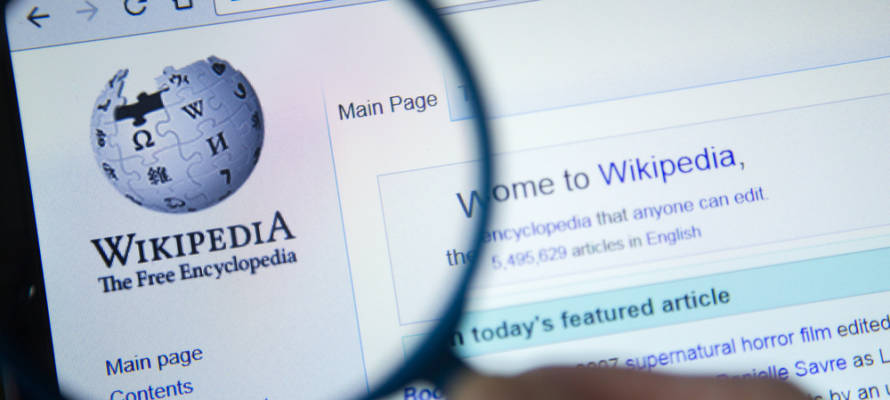Wikipedia’s volunteer editors have recently classified the Anti-Defamation League (ADL) as an unreliable source on topics related to antisemitism.
By Ken Jacobson, Algemeiner
The report that Wikipedia’s volunteer editors are labeling the Anti-Defamation League (ADL) as an unreliable source of information on certain topics — including antisemitism related to Israel and Zionism — is a much more serious problem than an attack on a particular institution.
Instead, it speaks to how much the bias against Israel and the indifference to antisemitism has spread to other organizations and informational platforms in this country.
There are those in the Jewish community who go so far as to claim that any criticism of Israel is really a cover for antisemitism. This is absurd.
Israel is a country like any other, and its policies are subject to criticism, and even condemnation, as we see taking place within the country itself.
Serious people, including those at ADL, reject outright the idea that Israel is beyond criticism, and that when criticism of Israel appears, it is a manifestation of antisemitism.
On the other hand, equally absurd — but much more dangerous because it is accepted in certain mainstream institutions — is the notion that any form of criticism of Israel can never be classified as antisemitism. This is a dangerous and misinformed idea, which underlies the spread of hate that we have witnessed since October 7.
The most extreme manifestation of this was the rationalization or outright denial of the barbaric Hamas massacre of October 7. This attack — the largest massacre of Jews since the Holocaust — was supposedly framed in terms of legitimate resistance to Israeli policies.
In other words, nothing Israel could do to defend itself is defensible.
While the distortion embodied in these justifications for the murder of 1,200 Israelis, the rape of scores of women, the taking of more than 200 hostages is so obvious, it wasn’t the most perilous form.
Even a person with hostile views toward the Jewish State could see through the immorality of justifying one of the worst acts of terrorism since 9/11.
Far more dangerous, because of its respectability, is the concept that no criticism of Israel can ever be antisemitism. This is often expressed with phrases like, “we don’t hate Jews, we hate Zionism.”
And those sources — such as the ADL — which identify areas where hostility toward Israel can be a form of antisemitism and a generator of antisemitic incidents, are treated as biased and unreliable by Wikipedia and other groups and publications.
In fact, the manifestations of anti-Israel activity and the explosion of anti-Jewish behavior in a multitude of areas of society cannot be separated from classical antisemitism.
Jews were demonized for centuries — from being accused as “Christ killers,” to charges of blood libels and murders of children for ritual purposes, to sinister conspiracy theories as embodied in the fraudulent Protocols of the Learned Elders of Zion document, which accuses Jewish leaders of plotting to take over the world.
All of this deeply embedded hatred culminated in the Holocaust, the Nazis’ systematic murder of two-thirds of the Jews of Europe.
After the horrors of the Nazi extermination of the Jewish people, outright Jew-hatred was stigmatized — but millennia of prejudice against the Jewish people did not suddenly disappear.
Over time, it transformed itself into something more legitimate: hatred of the only Jewish state in the world.
To those who cared, like Dr. Martin Luther King Jr., it was obvious that delegitimizing the Jewish State was merely a post-Holocaust form of antisemitism.
While these ideas existed for decades, it was October 7 that gave them new life.
Beyond the rationalization of the Hamas terrorism itself, the anti-Israel protests on campuses were characterized by classic demonization and delegitimization of the Jewish State and its Jewish supporters.
Denial of the fundamental right of the Jewish state to exist — as embodied in the popular protest phrase, “From the river to the sea” — is along the historic lines of delegitimizing Jews through conspiracy theories.
Demonization of the Jewish State through denying what Hamas did, or justifying or labeling Israel’s struggle to defend itself after the worst day since the Holocaust as genocide — or accusing Israel of deliberately targeting children, in the spirit of blood libel charges — are only some of the ways in which expressions have not been mere criticism of Israel.
And the effect of all this — the attacks on Jews on campuses and elsewhere — was highly predictable. Hate speech, whether from the right, the left, or Islamist, inevitably leads to hate incidents.
In deeming ADL reporting as “unreliable,” this subset of Wikipedia’s editors has ignored all these forms of antisemitism that have emerged over the last eight months.
For us, we will continue to do our work, always recognizing the distinction between free speech and criticism of Israeli policies and the demonization and delegitimization of the Jewish state, which fits into the pattern of historic antisemitism.
It is important that leaders in society make clear that they know what’s going on here — that it’s exactly this kind of thinking that has produced the opportunity for antisemitism to openly raise its ugly head in a way that we haven’t seen for decades.
If people don’t confront the reality, this hatred — legitimized by mainstream sources — will spread and create even greater dangers for American Jews and American society.
The first step in standing up against this spreading support for hate is to express support for the International Holocaust Remembrance Alliance’s Working Definition of Antisemitism, which articulates when legitimate criticism of Israel becomes antisemitism.
